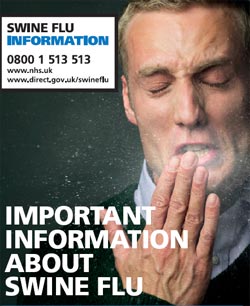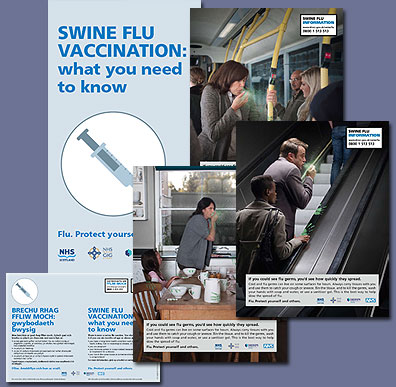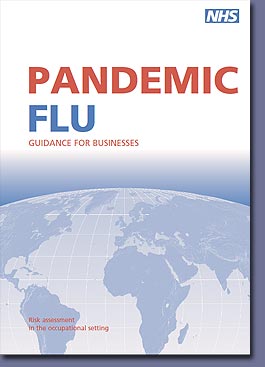Swine Influenza Alert
Information and Advice
21/1/2010: Swine flu cases are down, but deaths and serious illness remain a concern, show statistics released by the chief medical officer. Patients continue to be hospitalised and admitted to critical care facilities, although these numbers are falling off. Deaths attributable to swine flu are also still occurring.
Latest News for Scotland (28/01/10) - Latest news for Wales (27/01/10)
English Pandemic Flu Service: www.direct.gov.uk/pandemicflu Tel number: 0800 1 513 100
Scottish Swine Flu Vaccination Helpline: 08000 282 816
National Pandemic Flu Service Website - Antiviral Drugs Advice
What is Swine Flu? - How is swine flu different from seasonal flu or bird flu? - What are the symptoms?
What are the 'at-risk' groups? - What if I think I have Swine Flu? - What can we do?
BT's Advice? - NHS Advice & Information pages - Latest NHS News - CWU Advice
TUC Pandemic Advice (August 09) - Pregnancy and Swine Flu - UK Planning Assumptions
Flu Vaccine Information
The NHS in England, Scotland, and Wales has produced information leaflets for the public detailing facts about the newly, but limited, available vaccinations. Several leaflets and posters have been produced. Click on the one you want to download:
 NHS Advice:
NHS Advice:
If you have flu-like symptoms or been with someone who has:
* Stay at home and contact your GP or NHS Direct on 0845 4647
* Do NOT go into your GP surgery, or to a hospital, as you may spread the disease to others
* If you are unsure about your symptoms, use this special flu symptom checker
* Daily information on the pre-recorded swine flu telephone information line on 0800 1513 513 (or 0044 207 928 1010 from overseas)
* Pregnant women are advised to take the following steps to reduce their risk of infection and complications:
- observe good hand hygiene (frequent use of soap and water or sanitizer);
- wherever possible, avoid contact with someone who is known or suspected to have swine ‘flu;
- if they have ‘flu-like symptoms, to make early contact with their General Practitioner who may advise treatment with antiviral drugs.
There is no need for other family members (e.g. partners, children) to take special precautions but they should also practice good hygiene.
What is Swine Flu?
Swine flu is a respiratory disease of pigs caused by type A influenza viruses. Outbreaks of swine flu happen regularly in pigs. It is a form of influenza that originates in pigs but can be caught by, and spread among, people. People do not normally get swine influenza, though infections do sometimes happen. In the recent past, most human cases of swine influenza have been in people who were in close contact with pigs, such as farmers.
In the current outbreak the virus has been spread by person-to-person contact.
In the current swine flu outbreak, human infection with swine influenza A (H1N1) viruses have also been confirmed in the US, Canada, Spain, the UK, New Zealand, Israel, Austria, and Germany.
This has given rise to concern that the outbreak could become a pandemic flu - a global outbreak of flu that spreads quickly because it is a new type of virus that few, if any, people have resistance to.
A flu pandemic is a natural event that occurs from time to time. Last century, there were flu pandemics in 1918, 1957 and 1968, when millions of people died across the world.
Experts warn that another flu pandemic could happen soon, but they do not know when.
How is swine flu different from seasonal flu or bird flu?
Seasonal flu, caused by an existing flu virus, is a common infection in the UK that usually occurs during a two-month period in winter. For most people, it is an unpleasant but not life-threatening infection. People who are more at risk from it, such as older people, can be given a vaccine each year.
Bird flu, also known as avian flu, is influenza that, as its name suggests, is usually confined to birds. However, like swine flu, it can also sometimes be caught by people and by pigs.
If swine flu or bird flu do spread in people, it can be very serious and can cause death.
A pandemic occurs when a new flu virus appears in the human population and spreads from person to person worldwide. It is likely that such a virus will be caused by a bird or animal virus mixing with the human virus.
It is expected that an outbreak of pandemic flu will cause more illness and many more deaths than ordinary flu.
What are the symptoms of swine influenza?
The symptoms of swine influenza in people are similar to the symptoms of regular human seasonal influenza infection and include fever, fatigue, lack of appetite, coughing and sore throat. Some people with swine flu have also reported vomiting and diarrhoea.
What are the 'at-risk' groups?
The risk profile of the virus is still being studied but it is already known that certain groups of people are particularly vulnerable. These include:
- Patients who have had drug treatment for asthma in the past three years
- Pregnant women
- People aged 65 years and older
- Children under five years old people with chronic lung disease
- People with chronic heart disease
- People with chronic kidney disease
- People with chronic liver disease
- People with chronic neurological disease
- People with immunosuppression (whether caused by disease or treatment)
- People diabetes mellitus
What if I think I have Swine Flu?
- Read up on swine flu symptoms then use the NHS Direct swine flu symptom checker
- If you are still concerned, stay at home and call your GP who will be able to provide a diagnosis over the phone. Use NHS service search to find contact details
- If swine flu is confirmed, ask a healthy friend or relative to visit your GP to pick up a document entitling you to antiviral medication
- They will then need to pick the medication up at a collection point your GP will advise on (a local pharmacy or similar)
What can we do?
The single most effective way to stop or slow the spread of diseases such as swine flu is to prevent the spread of germs.
*
Wash your hands regularly with soap and water and cover your mouth if you cough or sneeze.
* You should also think about what you would do if you and your family all became ill.
* Who could you rely on for support, such as to collect medicines or shop for you?
* What food and other supplies should you keep a store of at home?
* If at all possible, avoid traveling to parts of the world where the infection is already present.
* Avoid mass gatherings of people anywhere if there is any reason to believe that infected people may be present (including yourself)
* Avoid gatherings in the workplace if it is possible to make alternative arrangements.
* If you have to mix with people that you believe could be infected, ensure you wear appropriate protective clothing, particularly a mask, and that you follow available advice for washing, cleaning and disinfecting.
* As far as possible, avoid touching the face, particularly around the areas of the mouth, nose and eyes.
* Seek help and advice at the first signs of any symptoms, particularly fever, coughing, sore throat or difficulty in breathing
* Stay at home and contact your GP or NHS Direct on 0845 4647
* If you are unsure about your symptoms, use this special flu symptom checker
Before travel
* Educate yourself on the current situation in the country you plan to visit Visit your doctor for advice and ensure you are up to date with all routine vaccinations.
* Flu of any kind is bad enough by itself without suffering other infections at the same time.
* Check out health care resources in the destination country before leaving Ensure your medical and travel insurance are sufficient to get you home in an emergency
After travel
*
Monitor your health for at least a couple of weeks after your return.
* If you need to consult a medical practitioner, do so only by telephone and be sure to inform them where you have been and when.
*
Avoid unnecessary contact with others to minimise the potential for any infection to spread.
What Advice Has BT Issued?
BT has issued the following advice to managers (July 24th 2009):
The swine flu virus is now circulating widely in the community, especially in the UK, and we can expect a significant number of colleagues to catch it. If numbers increase as predicted over the coming weeks, up to 10% of our workforce could be off sick at the same time for a short period. While your business unit has developed robust contingency plans to cope with increased levels of absence, I would like your help in several areas so we can deal effectively and fairly with this difficult situation.
1. Report sick absence promptly and accurately
Report anyone who is sick, whatever the cause, on the first day of absence using The People System or Automated Attendance Management – see http://humanresources.intra.bt.com/10919 for further guidance.
UK-based managers should also complete an additional reporting form for swine flu.
The additional swine flu data will help us to more accurately identify trends in absence by function and location. Please complete the form fully for each of your people who is absent for a reason you believe to be swine flu-related, whether they themselves are sick or if they are absent caring for others.
2. Treat pregnant or vulnerable staff sensitively
Pregnant colleagues and those with underlying health problems (eg diabetes, heart, lung or kidney disease) are at an increased risk from swine flu. Please bear in mind that they may be very worried about catching the virus and do what you can to accommodate their concerns. Consider adjustments like reduced business travel, altered attendance patterns to avoid peak hours or allowing flexible working where this is operationally possible.
3. Make sure people in your team who are sick stay away from work
Anyone in your team who displays flu-like symptoms is potentially infectious and should stay away from work for the few days it takes the symptoms to clear. I know it sounds obvious, but please make sure they do this.
4. Keep updated
Please keep swine flu in perspective. While it’s more infectious than normal flu, the symptoms are relatively mild for the vast majority of people. Most will just feel unwell for a few days before making a full recovery. Remember the hygiene message – Catch It, Bin It, Kill It – and if you’re heading off on holiday soon have a great time.
Further news updates can be found on this website and also here (may take a while to load)
Useful websites: World Health Organisation -
NHS Advice and information -
Health Protection Agency
-
HPA RSS News Feed
National Pandemic Flu Service Website - Antiviral Drugs Advice
What is Swine Flu? - How is swine flu different from seasonal flu or bird flu? - What are the symptoms?
What are the 'at-risk' groups? - What if I think I have Swine Flu? - What can we do?
BT's Advice? - NHS Advice & Information pages - Latest NHS News - CWU Advice
TUC Pandemic Advice (August 09) - Pregnancy and Swine Flu - UK Planning Assumptions




